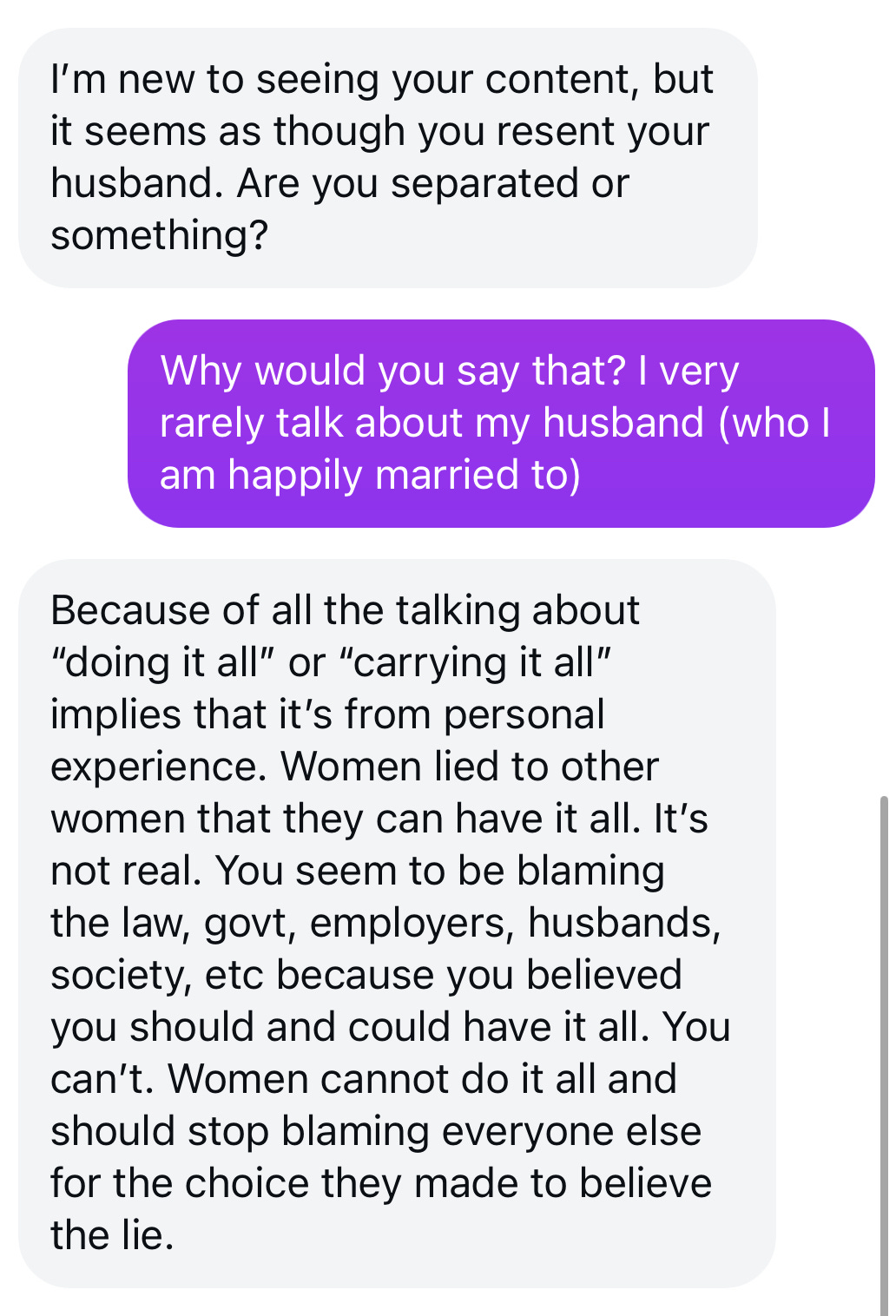I Have Learned It Wasn’t Just Me—And It’s Not Just You
Why the Mental Load Isn’t Your Personal Failure—And Who’s Really to Blame
I remember the early days of motherhood so vividly—exhausted, overwhelmed, and carrying the weight of what felt like an entire household on my back. The hardest part wasn’t just the sleepless nights or the never-ending to-do list. It was the creeping feeling that I had failed.
That somewhere along the way, I had taken a wrong turn. That I had made a mistake.
That I had done something wrong, and that’s why my partner wasn’t carrying his fair share of the mental load. That’s why I felt like I was drowning. It was my fault.
And I think so many of us feel this way because we’ve been conditioned to believe that these struggles are personal failures rather than the result of deeply ingrained societal structures.
If you’re struggling to pay for childcare, you should have planned better.
If your partner isn’t stepping up, you should have chosen a better man.
If you feel overwhelmed by domestic labor, you should have set clearer expectations before having kids.
The blame always lands on women. It’s easier to tell us we should have made better choices than to confront the fact that our society isn’t set up for true equity.
And this isn’t just coming from men—it’s coming from other women, too.
The DM That Proves My Point
Recently, I received a DM that stopped me in my tracks. It was from a woman who wasn’t upset with men, or with our government, or with our broken childcare system.
She was pointing the blame at us—at women—for "believing the lie."
She blamed women for expecting equality in the first place.
Instead of calling out the liars—the men who promised equal partnerships and then didn’t deliver, the government that has made childcare unaffordable, the workplaces that punish mothers for existing—she blamed women for believing that a better, fairer reality was even possible.
This is what internalized misogyny looks like.
Why Are We Blaming Women Instead of the System That Fails Us?
When we place the blame on women for our own oppression, we do the work of the patriarchy for them.
Think about it—what’s easier:
Calling out individual women and telling them they should have chosen differently?
or
Acknowledging that we have a government that refuses to support families, a corporate system that punishes mothers, and an entire culture that teaches men that caregiving isn’t their responsibility?
The first option is easier. It allows us to cling to the idea that if we had just done things right, we wouldn’t be struggling.
But the reality is, even the most prepared, the most thoughtful, the most "intentional" women still find themselves drowning under the weight of motherhood. Because this isn’t about bad choices. It’s about a system designed to extract as much unpaid labor from women as possible.
I Do Blame Someone—And It’s Not Women
I blame:
Our government—for failing to provide paid parental leave, affordable childcare, and policies that actually support families.
Our workplaces—for making it impossible to balance career and caregiving, for forcing women into impossible choices, and for penalizing mothers while rewarding fathers.
Men—not all men, but enough men, who enjoy the benefits of women doing the majority of domestic labor and childcare without ever questioning why. Who don’t see a problem because it’s not a problem for them.
I do not blame women for believing that an equal partnership was possible.
I refuse to blame women for wanting something better.
And I sure as hell will not be mad at women for demanding more.
In Other News…
If you want to hear more from me this week, here's where you can find me:
My Audio Course is on Presale!
For those of you who are feeling the weight of the mental load and want practical strategies to shift the balance in your home, my audio course is officially on presale!
The 2025 Happy Mom Summit: Registration is officially OPEN!
I'm excited to share that I'll be a speaker at this year's Summit! Grab your free ticket here!






Love this! I had a comment from another woman recently who felt it necessary to put a plug in for the men I was writing about as if MY experiences made the men look bad. But she was failing to look at the bigger picture of the societal and structural systems that led to the situation I was writing about. Those systems (and us buying into them) are what unfairly burdens women and keeps us all stuck. I love how succinctly you write about this.